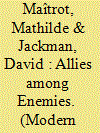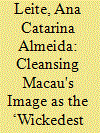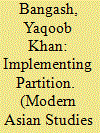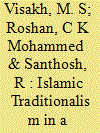|
|
|
Sort Order |
|
|
|
Items / Page
|
|
|
|
|
|
|
| Srl | Item |
| 1 |
ID:
181127


|
|
|
|
|
| Summary/Abstract |
The authority of political leaders in Bangladesh rests on diverse qualities, not least of which are the muscle and finance they can mobilize, and the relationships they can craft with senior party members. These are utilized to confront rivals both within and outside their own party. In some instances, the intensity of intra-party competition can be so severe that a further quality emerges: the capacity to find allies among enemies. Building local inter-party alliances can bolster the authority of politicians, yet be to the detriment of party coherence. This argument is developed through an analysis of mayoral and parliamentary elections held in the past decade in a small Bangladeshi city, where a ruling party member of parliament (MP) and opposition mayor appear to have developed such a relationship. This has thwarted the electoral ambitions of their fellow party members and has posed a serious challenge to party discipline. While political competition is often seen as being either inter- or intra-party, here it is focused around inter-party alliances. This portrayal suggests we need to give greater emphasis to the decentralized and local character that political authority can take in Bangladesh.
|
|
|
|
|
|
|
|
|
|
|
|
|
|
|
|
| 2 |
ID:
181121


|
|
|
|
|
| Summary/Abstract |
This article discusses the Eurasia Film Company (hereafter Eurasia), which was established in Macau in 1954; the making of its film Long Way, released in 1955; and more generally the issue of film production in Macau in the 1950s. This was a period of crisis for Portugal: despite the beginning of decolonization in the post-war era, the regime's policy was to preserve the colonies. It appropriated ‘Luso-tropicalism’, a theory developed by Brazilian sociologist Gilberto Freyre, which argued that the Portuguese had created a harmonious hybrid civilization in the ‘tropics’ through biological and cultural miscegenation. Luso-tropicalism became a major propaganda tool used by Portugal to deflect decolonization. Eurasia, which had links to the colonial government, presented a Luso-tropical ideal not only in terms of the content of the film Long Way which celebrated interracial love but also by its very nature—it was a Sino-Portuguese enterprise that also had Eurasians as shareholders—and in its production method. Its main objective was to propagate a positive image of Macau, in response to its pervasive negative portrayal in the international press and films, which often characterized it as a centre of vice. Long Way specifically responded to Hollywood and French films set in Macau by using similar elements, plot, and characterization, but it transformed Orientalist tales of crime, smuggling, and sin into a Luso-tropical story of refuge, order, and interracial love. Eurasia aimed to cleanse Macau's image and thereby justify Portuguese sovereignty in the territory in a period of crisis and uncertainty marked by decolonization, the Cold War, and tense Sino-Portuguese relations.
|
|
|
|
|
|
|
|
|
|
|
|
|
|
|
|
| 3 |
ID:
181124


|
|
|
|
|
| Summary/Abstract |
This article examines the little-known but exceptionally well-documented German Schlagintweit brothers’ expedition to India and Central Asia in 1854–58, under the auspices of the British East India Company and the king of Prussia. The brothers’ careers present an instructive study of the opportunities and conflicts inherent within transnational science and the imperial labour market in colonial India in the course of the nineteenth century. Until now, historians have largely emphasized the ways in which European East India companies provided scientific practitioners with professional mobility from the seventeenth to the mid-nineteenth centuries. In these accounts, German scientific practitioners are represented as especially mobile, moving more or less freely within foreign empires, because at the time no ‘German’ empire existed that might compete for allegiances and make them appear suspect. My article, in contrast, offers a revisionist account of this globalizing picture in two senses. First, a close look at the local everyday practices of the Schlagintweit brothers’ expedition highlights the considerable tensions and frictions that accompanied imperial recruitment to South Asia—even for German scientific practitioners. What emerges instead is a rich picture of the contradictory interpretations of supposedly cooperative projects among contemporaries, and the instrumentalization of scientific activities for political ends in the Indian subcontinent, for both established and aspiring colonial powers. Second, the ways in which the Schlagintweits’ scientific expedition was represented and remembered in subsequent decades shows how the politics around transnational science projects only intensified with German unification.
|
|
|
|
|
|
|
|
|
|
|
|
|
|
|
|
| 4 |
ID:
181123


|
|
|
|
|
| Summary/Abstract |
This article focuses on the workings of the Punjab Partition Committee in the crucial months of July and August 1947. In bringing new material to the historiography of partition, this article challenges the widely held assumption that the Punjab Partition Committee did not deliver. It argues that one must assess and value the large degree of cooperation and agreement between Punjab political leaders on the Committee, despite the charged political and communal atmosphere of the summer of 1947. Furthermore, it argues that the Committee created a limited sense of order during the disarray that prevailed in the run-up to the Transfer of Power. This order was brought about by the cooperation and work of the ‘middle tier’—the bureaucrats and other officials who are often missing from partition literature. The article shows the hard, bureaucratic—yet human—side of partition during these deliberations: at the same time as these people were carrying out partition, they were also suffering its effects. Finally, the Committee's negotiations show how the soon-to-be-established provinces and dominions were setting up their respective states through the procurement of assets and resources.
|
|
|
|
|
|
|
|
|
|
|
|
|
|
|
|
| 5 |
ID:
181126


|
|
|
|
|
| Summary/Abstract |
In our ethnography among traditionalist Sunni Muslims of Kerala, South India, we observe the emergence of new intellectual critiques of Islamic reformism and a revival of ‘traditional’ Islamic articulations. A new class of traditionalist Sunni ulama, claiming to be ‘turbaned professionals’, plays an instrumental role in providing epistemic sanctioning to ‘traditional’ Islamic piety while simultaneously grounding it within the discourses and processes of neoliberal developmentalism. Such assertions of traditionalist Sunni Muslim identity challenge the conventional understanding of Islamic reformism as a hallmark of the progressive understanding of faith and traditionalism as its ‘anti-modern’ other. The article argues that this discursive shift of Sunni Islamic traditionalism in Kerala since the 1980s from defensive to more assertive forms has to be located in the context of wider socio-economic change within the community facilitated by structural as well as cultural forces of globalization. We point out that this process traverses the local, national, and global scales of identification, and results in intense negotiations between local identifications and ‘true Islamicate global imaginations’. These negotiations bring in new discourses around the question of ‘authentic’ Islamic practices and sensibilities among the traditionalist Sunni Muslims, forcing us to locate the question of their identity formation beyond the boundaries of communities and the nation states that ensconce them.
|
|
|
|
|
|
|
|
|
|
|
|
|
|
|
|
| 6 |
ID:
181120


|
|
|
|
|
| Summary/Abstract |
In 1648, the Portuguese Estado da Índia found itself at a crossroads. After nearly five decades of attacks by a variety of adversaries—the Dutch East India Company, the Safavids, the Mughals, the Tokugawa shoguns, and the rulers of Kandy, among others—and in the context of the ‘Restoration’ of the Braganza dynasty in Portugal in 1640 and the separation of Portugal from Spain, a brief respite was offered. This article looks at how the situation was diagnosed by various contemporary authors, both outsiders and consummate insiders, such as the viceroy Dom Filipe de Mascarenhas. It suggests that the heavy constraints placed on the state by external forces as well as by forces of internal dissension compelled it to reinvent itself, a process that eventually began in the 1660s. However, this reinvention was not about simply imitating its great rival, the Dutch East India Company.
|
|
|
|
|
|
|
|
|
|
|
|
|
|
|
|
| 7 |
ID:
181122


|
|
|
|
|
| Summary/Abstract |
This article scrutinizes the negotiations with, and discursive refashioning of, Hong Kong identity during and after the Umbrella Movement (2014–16). I argue that these discursive experimentations borne out of the Umbrella Movement bring to light Hong Kong's uniquely cultural formulations of democratic self-determination that exceed the traditional analytic framework of Hong Kong cultural studies. The article analyses literary works as a hitherto neglected facet of the ‘Umbrella culture’ that, as a whole, acts as a discursive laboratory for multiple reflexive theorizations of Hong Kong identity and democratic subjectivity to be devised and debated. Cases studied here include the protesters’ on-site cultural expressions and two major Hong Kong literary authors: Dung Kai-cheung and Wong Bik-wan. This article examines social-movements artworks and literary works in terms of their performative and ethnographic dimensions, arguing that they are important intellectual and cultural-political processes to produce new knowledge about collective identity. This article first demonstrates how the Umbrella artworks repurpose the performative and the ethnographic strategies in Saisai's canonical novel, My City (1975), often cited as the ur-text of Hong Kong identity, to proclaim themselves as ‘we the Hong Kong people’. After reading Dung's and Wong's Umbrella-related works, I then show in this article that the performative and the ethnographic can open up spaces to reconfigure collective identity beyond its existent discourses. Putting theories of performativity into dialogue with critical ethnography, I consider the politics of negotiating and debating cultural identity in literature and protest arts as integral to postcolonial democratic action.
|
|
|
|
|
|
|
|
|
|
|
|
|
|
|
|
| 8 |
ID:
181125


|
|
|
|
|
| Summary/Abstract |
Through engaging with everyday practices among student activists in contemporary Indian campus politics, this ethnographic study examines the breadcrumb trail between the left and self-fashioning. It focuses on a performative modality of political representation in Indian democracy by tracing the formation of biographical reconfigurations that implement subject-oriented techniques. The article charts their relevance in producing political legitimacy. It engages with the way in which personal reconfigurations are mobilized to recruit and appeal to both subaltern and privileged communities, thus generating universalistic representative claims and political efficacy.
|
|
|
|
|
|
|
|
|
|
|
|
|
|
|
|
|
|
|
|
|